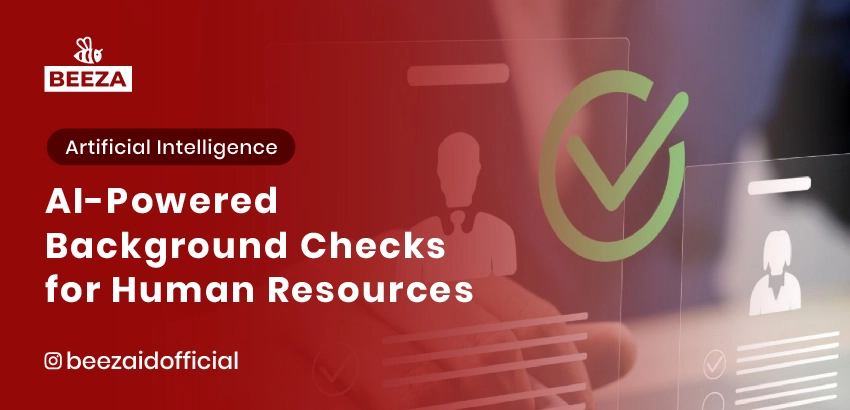
Background checks are one of the most critical stages in the recruitment process. Their purpose is to ensure that the selected candidates possess the required qualifications and do not have histories that could harm the organization. However, as the workforce becomes increasingly complex and the volume of candidates rises, traditional background check methods are starting to show their limitations.
This is where Artificial Intelligence (AI) technology steps in, offering faster, more accurate, and more efficient solutions. With AI, background checks can be conducted more thoroughly and comprehensively, reducing the potential for human error during the verification process. This article will explore how AI can improve background checks in Human Resource Management (HR).
Why Are Background Checks Important?
Background checks in recruitment are crucial to ensure that companies do not hire individuals who could pose risks to the organization’s security, reputation, or productivity. Here are some reasons why background checks are essential:
- Organizational Security
Background checks help ensure that prospective employees do not have a criminal history or harmful behavior, which is critical to safeguarding the company’s and employees’ safety. Without proper checks, organizations risk onboarding individuals who could threaten the workplace environment. - Credential Verification
Background checks also serve to verify the information provided by candidates. This includes verifying work history, educational background, and certifications claimed by the candidate. - Fraud Prevention
With the increasing use of fake identities or manipulated documents, background checks are a vital tool for fraud prevention. They help companies avoid legal risks and financial losses caused by dishonest employees. - Building Trust in the Company
Thorough background checks can enhance stakeholder trust, such as that of investors, clients, and business partners, who value transparency and credibility in a company.
Challenges in Traditional Background Checks
Manual or traditional background checks come with significant challenges, such as:
- Slow Processes
Manual background checks take considerable time, especially when involving multiple candidates. Contacting references, verifying education, and checking work history can take months, potentially delaying the recruitment process. - Prone to Human Error
Manual background checks heavily rely on human accuracy, which means mistakes or oversights can occur. This can lead to inaccurate data or poor hiring decisions. - Difficulty in Analyzing Large Data Volumes
The increasing amount of data involved in background checks (such as social media data, criminal records, and work history) makes traditional methods inefficient in handling such large volumes. - Geographical Limitations
Background checks are often restricted by geographical boundaries. For instance, verifying records or work history for candidates who worked abroad can be more complicated and time-consuming.
Benefits of AI-Powered Background Checks
AI technology offers advanced solutions for background checks with numerous clear benefits, such as:
- Faster and More Efficient Screening
AI can process large amounts of data very quickly. For example, using data-matching algorithms, AI can verify work history or educational records within minutes, accelerating the overall recruitment process. - Higher Accuracy
With the ability to analyze patterns in data and detect inconsistencies, AI enhances the accuracy of background checks. For instance, AI can identify errors in candidate information, such as work history discrepancies. - Social and Online Data Analysis
AI can also analyze data from social media and other online platforms to provide a more comprehensive view of a candidate’s behavior. This enables companies to assess more than just work or educational history but also behavioral patterns relevant to the applied position. - Reducing Bias in Recruitment
AI helps reduce human bias in background checks. By utilizing objective algorithms, AI ensures all candidates are evaluated based on data, not personal assumptions or preferences. - Enhanced Data Security
AI-based systems make it easier for companies to manage and secure sensitive candidate data. This technology protects personal information and prevents data breaches that could harm candidates or the company.
Case Study: Using AI in Background Checks
Problem
A multinational technology company faced challenges in verifying new employee credentials. They often found that the information provided by candidates was not always accurate, and the time-consuming verification process led to the loss of potential candidates.
Solution
The company adopted an AI-powered background check solution to speed up and improve data verification accuracy. Their AI system utilized machine learning to verify educational credentials, work history, and even analyze data from social media.
Result
- Background check times were reduced by up to 70%.
- Data accuracy improved significantly, with fewer verification errors.
- The recruitment process became more efficient and transparent, allowing for quicker hiring of qualified candidates.
Conclusion
AI-powered background checks provide an effective solution to the challenges HR departments face in verifying candidate credentials and identities. By using AI, companies can accelerate recruitment processes, reduce human error risks, and improve data accuracy and security.
As the complexity of the workforce grows, AI can be an invaluable tool in creating a more efficient, secure, and transparent recruitment process.
If your company is ready to leverage AI to enhance background checks, now is the perfect time to integrate this technology into your recruitment system. For more information about AI-Powered Background Checks for Human Resources contact us now.